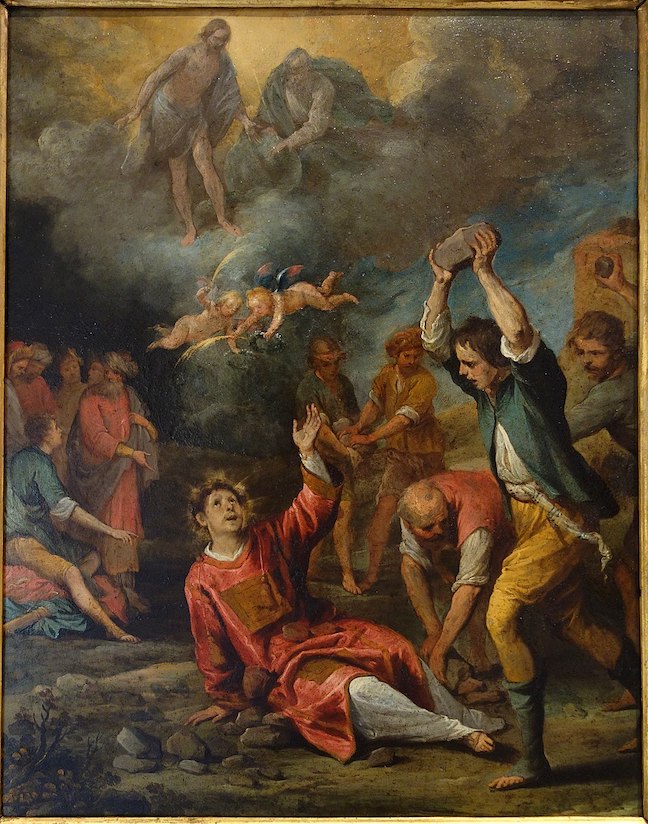Martyr –
1: a person who voluntarily suffers death as the penalty of witnessing to and refusing to renounce a religion
2: a person who sacrifices something of great value and especially life itself for the sake of principle
a martyr to the cause of freedom. . .
——————- Merriam-Webster Dictionary
The word martyr comes from the Greek word for “Witness.” Many apostles, disciples, and members of the early followers of “The Way” were persecuted and executed for their proclamations of their beliefs and steadfast refusal to renounce those beliefs. For early followers of “The Way,” Jesus himself was a martyr, one who witnessed to his faith in God and his continual teachings of a belief that did not include emperor worship, which the Romans demanded, and failure to follow all the purity rules to which the Pharisees and high temple officials judged the purity of the people.
Martyrdom has been like rogue and tidal waves in the history of religion and then political and social/cultural practices. Things will go fairly normally and quietly for a time; then, suddenly, a vast and menacing wave will rise and roll along, damaging anything in its way. In its wake, it leaves not only physical destruction but the loss of life, fear, anxiety, and years of the expensive and expansive rebuilding of structures, economies, and senses of any kind of normalcy.
We are used to using the term “martyr” for people who have given their lives for causes they believed in and devoted their lives to. Martin Luther King Jr is a strong example, but how many other African-Americans have died because they stood up for equal rights for themselves and all people? We don’t know all their names, but we gradually hear of more and more of them. The African-American people are not the only ones we recognize. Other cultural groups have come forward, naming their martyrs and the reasons for their martyrdoms. We are learning almost daily that the ones who have contributed most heavily to the martyrdoms of others have actively pursued privilege and power in the name of history and cultural origin.
Today we look further abroad to learn about the martyrdoms of three Chinese laywomen who not only stood for their faith but taught it and preached it until Christianity became the subject of rogue waves of anti-Christianity in various parts of China in the nineteenth century. Agnes Tsao Kou Ying (1821-1856), Agatha Lin Zhao (1817-1858), and Lucy Yi Zhenmei (1817-1862) were devout Roman Catholics who studied, prayed, and taught local people, especially the children, the faith in which they believed so fervently. The provincial administrator of Guizhou Province, where all three lived and worked, hated the Christian faith, although the local magistrate supported it. The result was that the administrator had Christian groups rounded up and tortured, ultimately causing the deaths of the three women. Agnes was locked in a cage so small she could only stand up. After constant prayers to God, Agnes died three days later. Agatha was beheaded two years later for her refusal to reject her faith. Yi Zhenmei was rounded up with others, hauled off for a speedy trial and death sentence for failing to renounce her faith. She was beheaded the next day. Pope John Paul II canonized all three of them in 2000 as testimonies to their faith and their examples of steadfast trust in God.
Today, we often hear people being labeled “martyrs” without any real cause other than believing they were entitled to something others disagree with. True, they claimed to be standing up for the rights of others who believed as they did, but they weren’t being persecuted for that belief, nor did they face possible death for it either. There are plenty of people around the world today who face death simply because of their skin color or distinctive clothing that marks their religion. Many of these walk in fear every day, never knowing when they might be targets of those who fail to understand that the right to bear arms does not include the right to shoot other people because of their color or clothing.
I wish Jesus would somehow tweet or post or take over all the media and tell people to “STOP IT!” The way we are behaving is not what Jesus had in mind, despite claims by others. Many genuine Christians march in solidarity with the oppressed and support the causes that favor those whom Jesus claimed as the Children of God: the needy, the oppressed, the poor, the sick, the ones falsely imprisoned, and the hopeless.
The Chinese martyrs were women doing what they were convinced God wanted them to do and, with strong faith, faced death without cringing or wavering. Most of us will never face such persecution or death for our beliefs. Still, Jesus won’t let us simply skate along, acting as part-time or even pretend-to-be-Christians. Every day, we are expected to work to strengthen our faith as surely as we go to the gym regularly to strengthen our muscles.
I am glad to learn about the Chinese martyrs. Their faith reminds me how much work I need to do to follow their example if and when I am called to do so.
Image: Martyrdom of St Stephen, Giovanni Andrea De Ferrari (1598-1669), oil on copper. Located at Accademia ligustica di Belle Arti, Genoa. Found at Wikimedia Commons.
Linda Ryan is a co-mentor for an Education for Ministry group, an avid reader, lover of Baroque and Renaissance music, and retired. She keeps the blog Jericho’s Daughter. She lives with her three cats near Phoenix, Arizona.

